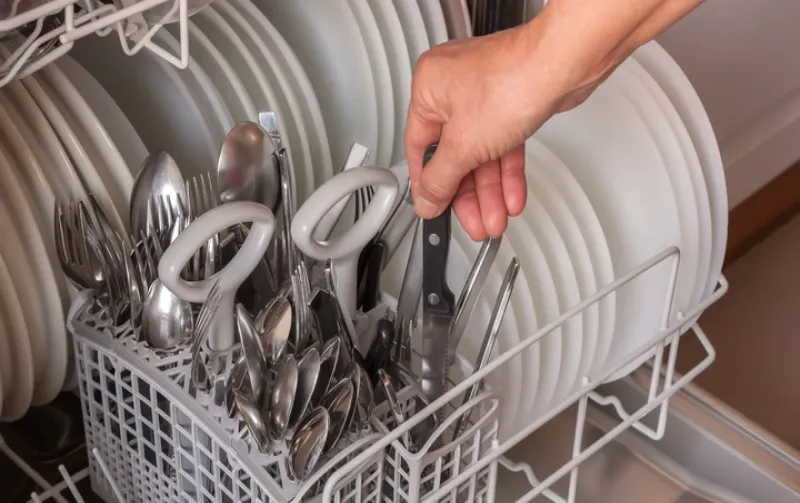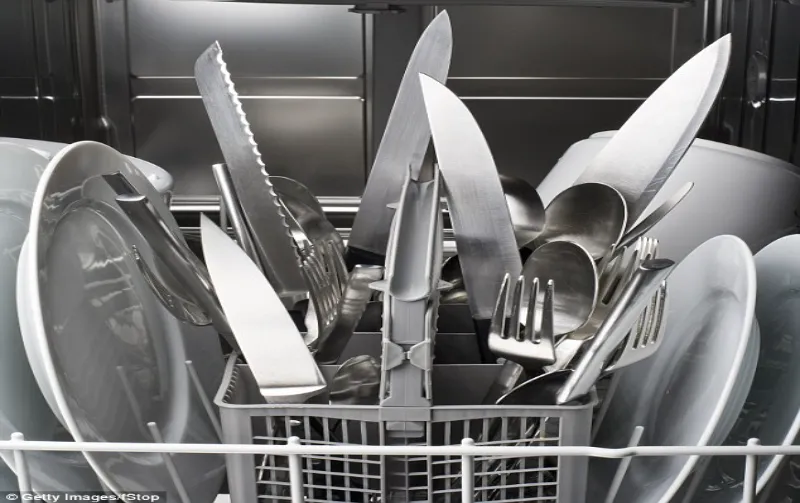Some knives are dishwasher safe, but many are not due to potential damage to the blades and handles. Always check the manufacturer’s recommendations before placing knives in the dishwasher.
Maintaining the condition and longevity of your knives is essential.
With this in mind, understanding proper care, including how to wash them, is crucial.
Many people ponder whether it’s okay to clean knives in the convenience of their dishwasher.
The risks include dulling of the blade, warping of wooden handles, and exposure to harsh detergents.
While the thought of simply tossing knives into the machine with other cutlery might be tempting, the reality is that it could shorten the life of your knives.
Therefore, it’s important to identify which types of knives can handle the intensity of a dishwasher cycle and which should be carefully washed by hand.
Always prioritize the care instructions provided by your knife’s manufacturer to avoid any mishaps and ensure your cutting tools remain in peak condition.

The Importance Of Hand Washing Knives
When pondering whether to place your knives in the dishwasher or to wash them by hand, considering the lifespan and performance of your cutlery is crucial.
Hand-washing knives are more than just a meticulous preference; it’s a practice that can significantly extend the functionality and appearance of your tools.
Let’s dive into the reasons that make hand washing an essential part of knife care.
Reasons For Hand Washing Knives
Dishwashers can be harsh environments for delicate items such as knives.
From high temperatures to potent detergents and jostling, multiple factors can contribute to the deterioration of knives in a dishwasher.
Detailing the reasons for hand-washing knives clarifies why this method is not just beneficial but essential for preserving your cutlery:
- Knives can knock against other utensils, potentially damaging their handles and blades.
- Hand washing allows for gentle and thorough cleaning, targeting hard-to-reach areas.
- Unlike in a dishwasher, hand-washed knives can be dried immediately, reducing the risk of water spots and rust.
- This process enables regular inspection of knives for any signs of wear or damage.
Effect On Knife Material
The materials that make up a knife, from the stainless steel blade to the wooden, plastic, or composite handle, react differently to the conditions inside a dishwasher.
High heat and moisture levels can degrade these materials, resulting in:
- Chemicals in dishwasher detergents can dull the shine and color of knife handles and blades.
- Prolonged exposure to water can cause wooden handles to warp, crack, or loosen.
- Repeated exposure to dishwasher cycles can weaken the metal, making it more susceptible to breakage.
Preventing Corrosion
Corrosion is a knife’s enemy, and the humid, high-temperature environment of a dishwasher promotes this damaging reaction.
Stainless steel, while resistant, is not entirely impervious to rust.
Certain types of steel, especially those with high carbon content, can rust easily if not properly cared for.
Hand washing with mild soap, followed by immediate drying, is pivotal in preventing corrosion, and ensuring that knives remain in their best form for cooking tasks.
Maintaining Sharpness
A knife is only as good as its blade’s sharpness, and a dishwasher’s harsh conditions can quickly dull a sharp edge.
Abrasive detergents, along with the potential for a knife to rub against other items, can rapidly degrade the sharpness of the blade.
Hand washing facilitates careful handling and ensures that the edge does not come into contact with other objects, preserving the blade’s sharpness over time.
Best Practices For Dishwasher Knife Care
Knives are essential tools in any kitchen, but taking care of them can sometimes feel like a puzzling chore.
Dishwashing your knives can be a contentious subject with passionate arguments on both sides.
To maintain their longevity and effectiveness, understanding proper knife care is pivotal.
Below are practical tips and best practices for those opting to use the dishwasher to clean their knives.
Preparing Knives For Dishwasher
Ensuring your knives are dishwasher-ready starts before they even touch water. Remove any food debris by wiping the blades with a paper towel or soft cloth. Check manufacturer recommendations to confirm if your knives are labeled as dishwasher-safe. Follow these preparatory steps to safeguard both the knife and your dishwasher:
- Inspect each knife for damage.
- Separate knives from other utensils to prevent contact damage.
- Align all knives with blades pointing in the same direction.
Proper Pre-rinsing
Begin the cleaning process by giving your knives a proper pre-rinse.
Use lukewarm water to gently rinse off any remaining particles.
Be cautious to avoid any injury and to maintain the sharpness of the blade.
A comprehensive rinse ensures that the dishwasher can do its job effectively without any pre-existing food residue hindering the cleaning process.
Loading And Placement Tips
Correct placement within the dishwasher ensures that your knives are safely and effectively cleaned.
Always place knives in the dishwasher with the blade pointing downwards to reduce the risk of injury when unloading.
Knives should be loaded in an individual slot on the utensil holder if possible or lay them flat in a secure position on the top rack to avoid jostling and potential damage.
Selecting Dishwasher-safe Knives
Not all knives are created equal when it comes to dishwasher safety.
Choose knives clearly labeled as such, and ideally, opt for those made from high-grade stainless steel which resists rust and corrosion.
Even some dishwasher-safe knives can benefit from occasional hand washing to preserve their edges and finish.
Knife Handle And Material Considerations
Be aware of the materials your knife handles are made from.
Plastic handles can generally withstand the dishwasher’s environment better than wood, which can warp or crack.
Moreover, noting the type of steel is crucial. Carbon steel blades, for example, can rust if not dried immediately after the washing cycle.
Therefore, always hand-dry knives promptly after the dishwasher cycle ends to prevent any water spots or corrosion.
By following these simple yet effective practices, you can ensure your knives remain sharp, durable, and ready for their next culinary adventure.
Regular maintenance and respecting the limitations of the dishwasher can greatly extend the lifespan of your kitchen knives.

Alternative Cleaning Methods For Knives
While the convenience of tossing knives into the dishwasher is tempting, it’s not always the best choice for preserving the sharpness and integrity of your blades.
Alternative cleaning methods not only extend the life of your knives but also maintain their performance.
Hand washing is the recommended approach for knife cleaning.
This method prevents the harsh conditions inside a dishwasher from damaging the knife’s material.
Follow these steps to hand wash your knives safely and effectively:
- Use a non-abrasive sponge or soft cloth.
- Gently scrub the blade under running water.
- Handle the knife with care to avoid accidents.
- Clean immediately after use to prevent residue from hardening.
When cleaning knives, opt for a mild detergent combined with warm water.
This gentle solution is effective in removing grease without causing damage to the knife’s edge or handle. Apply the following steps:
- Dissolve a small amount of mild detergent in warm water.
- Dip the knife into the solution and use a soft brush if necessary.
- Rinse thoroughly with clean water to remove any soap residue.
Proper drying and storage are crucial to prevent rust and maintain the knife’s sharpness. After washing, adhere to these practices:
- Dry knives immediately with a clean, soft towel.
- Avoid air-drying as it can lead to water spots and potential rusting.
- Store knives in a knife block, sheath, or magnetic strip away from other utensils.
To further enhance the lifespan of your knives, consider these additional care tips:
- Regularly inspect for signs of wear or damage.
- Use a cutting board to protect the blade’s edge.
- Avoid using knives on hard surfaces like glass or stone.
- Never use your knife as a can opener or screwdriver.
Maintaining the knife’s edge ensures optimal performance during each use.
Honing realigns the edge and should be done frequently, while sharpening grinds away material to create a new edge and is needed less often. Follow these suggestions:
- Hone with a rod before or after each significant use.
- Sharpen as needed based on the knife’s dullness and manufacturer’s guidelines.
- Seek professional sharpening services for the best results or use a proper sharpening tool.
Final Considerations
Embarking on the final stretch of our journey to understand knife care, we present crucial considerations to ensure your cutlery remains in peak condition for years to come.
Grasping the nuance of knife maintenance and dishwasher safety empowers users to strike a balance between ease and effectiveness in their kitchen practices.
Evaluating Individual Knife Care Needs
Each knife in your kitchen has unique needs, stemming from the material, construction, and intended use.
High-quality chef’s knives require meticulous attention to prevent edge dulling, while stainless steel utility knives might tolerate the dishwasher cycle better.
It’s essential to recognize these differences to tailor your approach and ensure each knife retains its sharpness and integrity.
Customizing Maintenance Approaches
The concept of one-size-fits-all does not apply to knife care.
Some may thrive with hand washing and immediate drying, while others can endure the occasional dishwasher trip.
Customizing your maintenance strategy to each knife’s design and your own usage patterns safeguards their longevity.
This may involve a mix of methods, balancing time efficiency with the care each knife demands.
Balancing Convenience And Knife Longevity Goals
Convenience often clashes with long-term knife care.
The lure of the dishwasher’s ease can be tempting, yet the potential drawbacks — like corrosion and dulling — loom large.
Striking a harmony between swift clean-up and preserving sharpness entails weighing immediate ease against the value of your long-lasting and dependable tools.
Can Knives Go In The Dishwasher?: The Ultimate Guide
After dissecting various factors, the guiding principle remains: consult your knife’s care instructions.
Most manufacturers will advise against the dishwasher, and for good reason.
Hand washing and careful drying maintain optimum conditions, but for the rushed or pragmatic, certain knives with dishwasher-safe claims can venture into the machine.
Even so, this choice comes with the caveat of occasional exceptions for the sake of preserving your cutlery’s edge and finish.
Frequently Asked Questions Of Can Knives Go In The Dishwasher
Can All Knives Go In The Dishwasher?
Not all knives are dishwasher-safe.
Do Dishwashers Dull Knife Blades?
Dishwashers can cause knives to dull over time due to jostling and contact with other items during wash cycles.
Best Way To Wash Kitchen Knives?
Hand wash kitchen knives with warm, soapy water and dry immediately to maintain their sharpness and longevity.
Are Ceramic Knives Dishwasher Safe?
Yes, most ceramic knives are dishwasher safe but hand washing is recommended to prevent chips or damage.
Conclusion
Caring for your cutlery properly ensures longevity and hygiene.
Dishwashing knives risks damaging both blades and the machine.
Hand wash to maintain sharpness and luster. Remember: Your prized knives deserve delicate, mindful cleaning.
Keep these tips close for a spotless, enduring kitchen collection!

